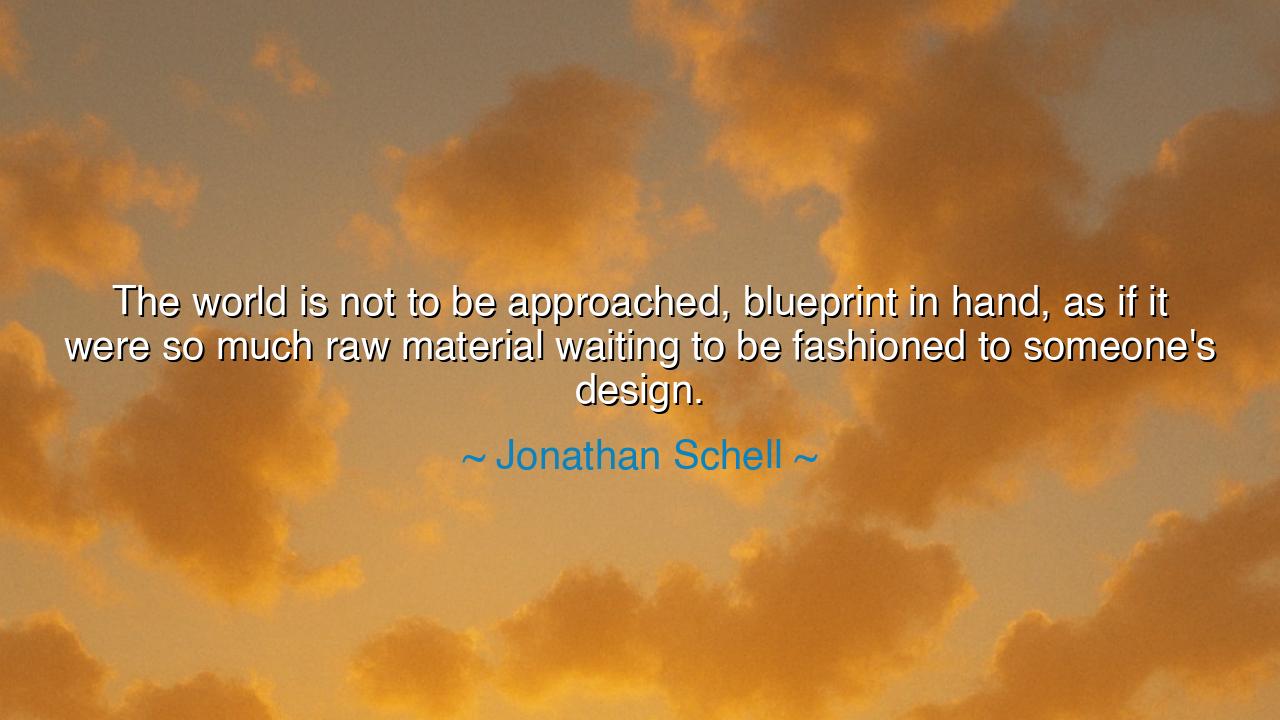
The world is not to be approached, blueprint in hand, as if it
The world is not to be approached, blueprint in hand, as if it were so much raw material waiting to be fashioned to someone's design.






“The world is not to be approached, blueprint in hand, as if it were so much raw material waiting to be fashioned to someone’s design.” Thus spoke Jonathan Schell, a voice of conscience in a century intoxicated with control. His words are not the counsel of passivity, but the cry of reverence—a call to remember that the world, in all its mystery and life, is not a machine to be built, but a living spirit to be understood. Schell warns us that to treat creation as raw material is to blind ourselves to its sacredness, to lose sight of the delicate harmony that sustains both the earth and the human heart.
In this age—and even in Schell’s own—mankind has been tempted by the arrogance of design, the illusion that the universe is clay beneath our hands. We draw our blueprints, we draft our empires, we divide land and sky into grids of ownership and utility, forgetting that what lives cannot be wholly controlled. The forests breathe, the oceans move, the winds remember paths older than our nations. When man believes he can impose order upon life as an architect upon stone, he forgets that life itself is the greater architect, and that we are not its masters, but its students.
Schell spoke these words amid the rising storms of the twentieth century—an age of nuclear fire, industrial conquest, and restless ambition. He saw that the same mind which builds can also destroy when it ceases to listen. To bring a blueprint to the living world, whether in politics, in nature, or in human affairs, is to risk reducing what is infinite into what is merely efficient. The totalitarian tyrants of his century—men who thought nations could be reshaped like clay—believed in their designs more than in their people. They drew maps of power upon the living soul of humanity, and the result was ruin. Schell reminds us that wisdom begins not with mastery, but with humility.
The ancients, who lived closer to the rhythms of the earth, knew this truth by heart. The Taoist sages of China taught that to impose one’s will upon the Way was to lose harmony with it. “The world,” said Lao Tzu, “is a sacred vessel; it cannot be improved. Whoever tampers with it, spoils it.” They knew that life flows according to its own deep laws—that the role of the wise is not to command, but to align themselves with those laws. Just as the farmer does not command the seasons but works with them, so too must humanity learn to cooperate with the living world, rather than rule over it.
There is a tale from the time of empire—a tale of Rome, whose engineers once sought to bend every river and level every hill in pursuit of order. Their aqueducts and roads shone with grandeur, yet the forests fell, and the soil, stripped of its spirit, turned to dust. The empire that tried to shape the world by force found itself hollowed from within. Its fall was not the work of invaders alone, but of its own presumption. For no power that ignores the living balance can endure. Schell’s warning is the echo of that ancient fall: to treat the world as material is to invite decay; to see it as a mystery is to find renewal.
Yet his words reach beyond nature—they touch the very fabric of human relationship. For even in our dealings with one another, we are tempted to come blueprint in hand, imagining we can shape others to our desires. Parents with their children, leaders with their people, lovers with one another—each may fall into the error of molding instead of nurturing. But a soul, like the earth, is not clay; it is seed. It grows best when tended with patience, not pressure. To honor others is to let them unfold according to their nature, not to your design.
The lesson, then, is this: approach life not as an engineer, but as a gardener. Build, yes—but build in partnership with the living world. Dream, but let your dreams breathe. Observe the laws of nature, the wisdom of the heart, and the rhythm of time. Do not seek to impose perfection, but to participate in balance. The world is not waiting for your blueprint—it is waiting for your reverence.
So, my child, remember the teaching of Jonathan Schell: The world is not yours to dominate but to serve. Walk gently upon the earth; listen before you plan; respect before you change. When you act, let your designs arise from harmony, not pride. For those who seek to conquer the world will lose it, but those who work with its spirit will help it live. And in that service—not in control—lies the truest mark of wisdom.






AAdministratorAdministrator
Welcome, honored guests. Please leave a comment, we will respond soon